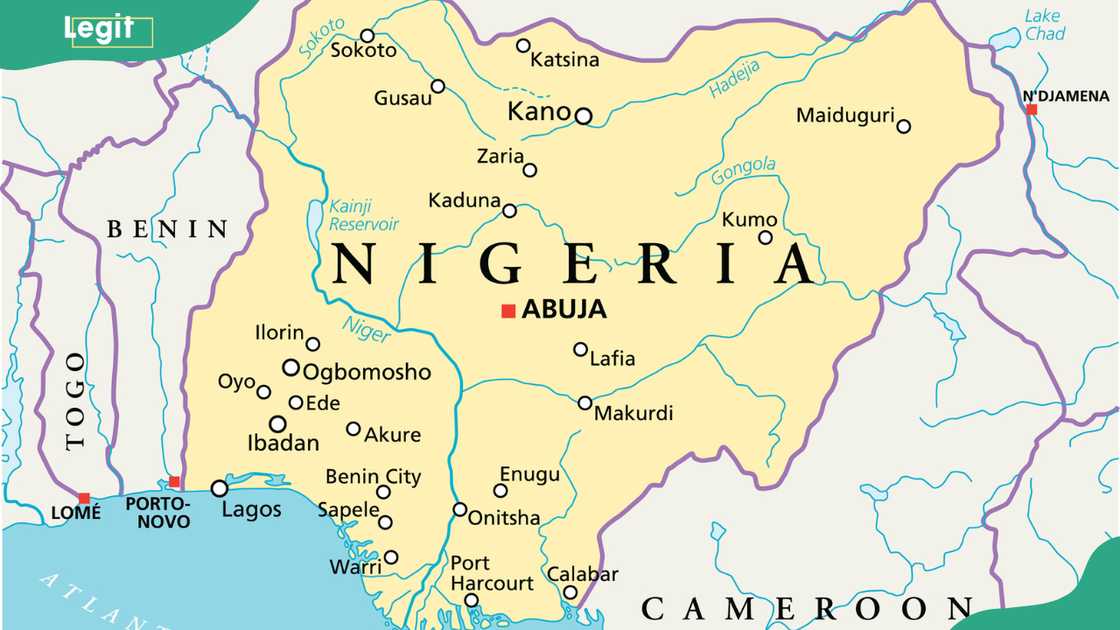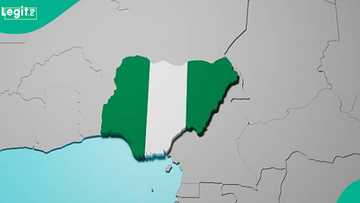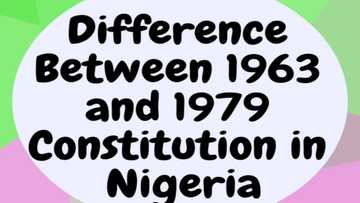Key historical and political reasons that led to the adoption of federalism in Nigeria
Federalism shapes how Nigeria is governed today. To understand its impact, one must first grasp the reasons that led to the adoption of federalism in Nigeria. This system was introduced to promote unity, manage diversity, and ensure effective governance across a vast country with different ethnic groups and regions.

Source: UGC
TABLE OF CONTENTS
- Key takeaways
- The primary reasons that led to the adoption of federalism in Nigeria
- What were the reasons for a system of federalism?
- Under what constitution did Nigeria become a federation?
- Why is Nigeria called the federation?
- What are the characteristics of a federation in Nigeria?
- Can you highlight two reasons why Nigeria adopted a federal system of government?
- What are the 5 important aspects of federalism in Nigeria?
- What are the problems of Nigerian federalism?
- What are the reasons why countries adopt a federal system of government?
Key takeaways
- Nigeria adopted federalism to ensure unity among diverse ethnic and cultural groups.
- The country's large population and size made centralised governance difficult.
- Federalism allows states to share power with the central government for effective administration.
- The British colonial structure influenced Nigeria's choice of federalism.
The primary reasons that led to the adoption of federalism in Nigeria
Federalism in Nigeria is rooted in history and political necessity. It was introduced to balance power between the federal and regional governments. The system ensures that governance is not concentrated in one authority but shared among multiple levels.
1. Colonial background and creation of Nigeria
Before 1914, Nigeria did not exist as one entity. There were two protectorates: the Northern and the Southern Protectorates. The British colonial government merged them to form Nigeria.
This artificial union of different regions and cultures later made federalism the best option for administration. Therefore, the colonial structure became one of the state's five reasons for adopting federalism in Nigeria.
2. The large size of Nigeria
Nigeria covers about 923,768 square kilometres. Managing such a vast territory under a single government would have been impractical.
Dividing power among federal and state governments allowed for better coordination and local governance. This is one of the 10 reasons for adopting federalism in Nigeria, which political scholars commonly cite.
3. High population
At independence in 1960, Nigeria's population was over 45 million. Governing a large and growing population from a central authority was impossible. Federalism made it easier to manage this population by giving each region administrative autonomy.
4. Influence of political leaders
Before independence, Nigeria's main political parties were regionally based: the NPC in the North, the NCNC in the East, and the AG in the West. Each wanted a share of power.
The leaders supported a federal system of government that allowed regional control while maintaining national unity. This political agreement was another key factor behind federalism's adoption.

Source: Getty Images
5. Ethnic and cultural diversity
Nigeria is home to over 350 ethnic groups. The three largest are the Hausa, Yoruba, and Igbo. Federalism provided a structure for coexistence among these groups.
It allowed each region to preserve its culture and traditions while contributing to national development. This diversity remains one of the strongest reasons for adopting federalism in Nigeria.
6. Framework for development
Federalism was also seen as a way to drive development across regions. Each state could focus on its priorities while the federal government handled national issues. The system mirrored models used by developed nations, which inspired Nigerian leaders after independence.
What were the reasons for a system of federalism?
Federalism ensures shared governance, promotes unity in diversity, and prevents dictatorship. It helps large countries manage resources and represent various regional interests.
Under what constitution did Nigeria become a federation?
Nigeria became a federation under the 1954 Lyttleton Constitution, officially recognised regional governments and defined power-sharing structures.
Why is Nigeria called the federation?
Nigeria is called a federation because power is divided between the federal and state governments. Both levels of government operate independently within their constitutional powers.
What are the characteristics of a federation in Nigeria?
Nigeria's federal structure features shared sovereignty, constitutional supremacy, division of powers, and autonomy for state governments.
Can you highlight two reasons why Nigeria adopted a federal system of government?
Nigeria adopted federalism to manage ethnic diversity and ensure the effective administration of its large population.

Source: Getty Images
What are the 5 important aspects of federalism in Nigeria?
Here are some of the most critical aspects of federalism in Nigeria.
- Promotes unity in diversity.
- Encourages regional development.
- Prevents abuse of power.
- Allows citizen participation at all levels.
- Strengthens democratic governance.
What are the problems of Nigerian federalism?
Despite its benefits, Nigerian federalism faces power imbalance, corruption, resource control disputes, and weak regional autonomy. These challenges have led to calls for restructuring and true federalism.
What are the reasons why countries adopt a federal system of government?
Many countries adopt federalism to maintain unity, share resources fairly, manage diversity, and promote balanced development.
The reasons that led to the adoption of federalism in Nigeria are deeply tied to its colonial past, vast size, population, and ethnic diversity. Federalism became the most practical system to unite different regions under one nation while allowing each to govern its affairs. Despite its challenges, it remains the foundation of Nigeria's political structure and continues to shape its democracy.
Legit.ng recently shared a list of the central Hausa states in Nigeria, highlighting their rich heritage and cultural significance. These states play a vital role in shaping Nigeria's cultural and historical identity.
The Hausa, one of the three largest ethnic groups alongside the Igbo and Yoruba, have a long-standing history, vibrant traditions, and far-reaching influence that extends beyond Nigeria's borders into other parts of Africa.
Source: Legit.ng

Adrianna Simwa (Lifestyle writer) Adrianna Simwa is a content writer at Legit.ng where she has worked since mid-2022. She has written for many periodicals on a variety of subjects, including news, celebrities, and lifestyle, for more than three years. She has worked for The Hoth, The Standard Group and Triple P Media. Adrianna graduated from Nairobi University with a Bachelor of Fine Arts (BFA) in 2020. In 2023, Simwa finished the AFP course on Digital Investigation Techniques. You can reach her through her email: adriannasimwa@gmail.com

John Ouma (Lifestyle writer) John Ouma is a journalist with six years of experience. He has published sharply argued think pieces that live at the intersection of power, politics, and society. He was awarded the FirstGen scholarship by Biola University and a merit-based scholarship by AMDA College and Conservatory of the Performing Arts in January 2021. He has worked for The Standard and Nation Africa as an opinion columnist between 2018 and 2022. He is currently working on his first novel—a literary fiction that traces the life of a contemporary Kenyan artist. Email: gervasjohn97@gmail.com





